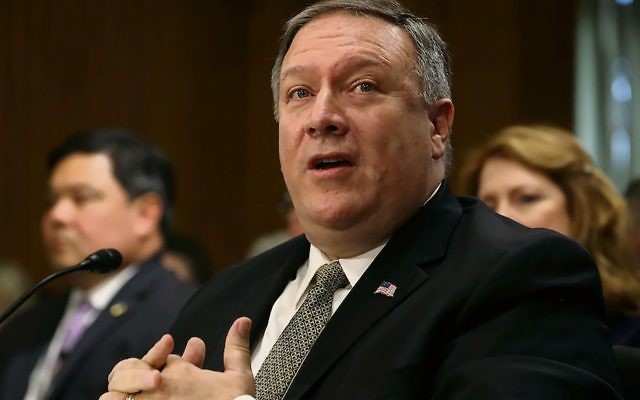Pompeo sets demands for new Iran deal
America has finally answered the question that the whole Middle East has been asking since early May: What does it want from Iran in return for a new deal?
AMERICA has finally answered the question that the whole Middle East has been asking since early May: What does it want from Iran in return for a new deal?
Israel was delighted with the hardline answer, as given by US Secretary of State Mike Pompeo in a landmark speech on Monday.
Enthusiasts for the nuclear deal that America left just over a fortnight ago were critical, and Iran’s Foreign Minister Javad Zarif said that Washington is resorting to “delusions” and “failed policies”.
One of the most important lines in the speech for Israel was Pompeo’s assertion about what he called the “Iranian wave of destruction in the region”. This “cannot be separated from the overall security picture”.
In other words, he was saying what Israel has been claiming for years – namely that you cannot draw a line between Iran’s nuclear aspirations and its backing for terror. This is what the nuclear deal did, calling for a clampdown on nuclear ambitions while leaving Iran’s terror activities until later.
And immediately, Pompeo translated this into a practical demand that Iran must meet if it wants a new deal that includes America. It “must end support to Middle East terrorist groups, including Lebanese Hezbollah, Hamas, and the Palestinian Islamic Jihad”.
In fewer than 20 words, he put forward a demand that, if accepted, would radically reduce Israel’s security headaches.
To give a little more context, Pompeo said that – contrary to what the Obama administration claimed – the Middle East is more dangerous, not safer, today as a result of the deal, the JCPOA (the Joint Comprehensive Plan of Action agreement between the P5+1 and the EU, and Iran).
“Lebanon is an even more comfortable home for Hezbollah today than it was when we embarked on the JCPOA,” he said. “Hezbollah is now armed to the teeth by Iran and has its sights set on Israel.
“Thanks to Iran, Hezbollah provides the ground forces for the military expedition in Syria.”
Just this, together with the obvious call for an end to nuclear enrichment and access to inspectors, would have led to Israeli PM Benjamin Netanyahu’s assessment that the Secretary of State had put forward a “correct policy”, and his call for the “entire international community to join this American position”. But there was more.
Iran must “end its threatening behaviour against its neighbours”, said Pompeo, adding that this “certainly includes its threats to destroy Israel”. And it must withdraw all forces under Iranian command from Syria, removing the influence of Tehran from Israel’s doorstep.
If Iran doesn’t agree to America’s terms, even facing the “sting” of “painful” sanctions, there were plenty of hints to what could be coming its way: regime change.
“Ali Khamenei has been supreme leader since 1989,” said Pompeo. “He will not live forever, nor will the Iranian people abide the rigid rules of tyrants forever. For two generations, the Iranian regime has exacted a heavy toll on its own people and the world. The hard grip of repression is all that millions of Iranians have ever known.
“Now is the time for the supreme leader and the Iranian regime to summon the courage to do something historically beneficial for its own people, for this ancient and proud nation.”
But there’s a big gap between rhetoric about change and actually bringing about regime change – a move that could involve major unpopularity for any administration at home, especially an administration whose supporters are wary of foreign ventures.
This is where Israel’s questions lie today. Does the US have another option on standby – a deal that will constrain Iran more than the deal it just walked away from, but less than the conditions outlined on Monday?
If so, where do the concessions lie, and, vitally for Israel, do they involve a compromise on the demand for Iran to exit Syria?
If regime change is a serious option, would this involve a military option, backing for local opposition or both? And how would Russia react?
All these help to shape the bottom line that concerns Israelis: What will the Trump administration’s decisions mean for life on the ground here?
What we learned this week is that the stakes have been raised high, and what America ideally wants, but we still don’t know exactly how the dice will roll.
NATHAN JEFFAY


comments